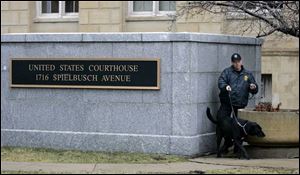
Trial underway for 3 Toledo men accused in plot to attack troops overseas
4/1/2008 Toledo terror trial
" rel="storyimage1" title="Trial-underway-for-3-Toledo-men-accused-in-plot-to-attack-troops-overseas.jpg"/>
Toledo terror trial
" rel="storyimage1" title="Trial-underway-for-3-Toledo-men-accused-in-plot-to-attack-troops-overseas.jpg"/>
A U.S. Marshall with a dog conducts a security check around the federal courthouse in Toledo on Tuesday morning. The trial of three men on trial for for terrorism conspiracy charges started Tuesday. (THE BLADE/DAVE ZAPOTOSKY) <br> <img src=http://www.toledoblade.com/graphics/icons/photo.gif> <b><font color=red>VIEW</b></font color=red>: <a href=" /apps/pbcs.dll/gallery?Avis=TO&Dato=20080401&Kategori=NEWS02&Lopenr=693802723&Ref=PH" target="_blank "><b>Toledo terror trial</b></a>
The trial of three suspected terrorists began Tuesday morning in U.S. District Court in Toledo with a federal attorney outlining more than three years of intelligence gathering on what he called "a terrorist cell here in Toledo, Ohio."
In an opening statement that lasted for more than 40 minutes, Assistant U.S. Attorney Thomas Getz said that the case against Mohammad Zaki Amawi, 28; Marwan Othman El- Hindi, 45, and Wassim I. Mazloum, 26, involved the use of a secret informant who spent years with the three men gaining their trust and sharing their plot with authorities.
The three men are each charged with planning to wage a "holy war" using skills they learned on the Internet. Specifically, the government alleged that the three conspired to kill or injure people in the Middle East including U.S. troops serving in Iraq by providing "support and resources." They also are charged with "distributing information regarding explosives."
Mr. Getz said that the informant recorded hundreds of hours of conversations with the men and that the recordings reveal that each says "an appropriate target of their jihad is American soldiers overseas."
Defense attorneys for Mr. Amawi and Mr. El-Hindi spoke about one hour each. They attacked the credibility of the government s key witness: Darren Griffin, a former military man with a sordid past who they said was paid more than $350,000 for his information.
Despite the government s contention that Mr. Griffin s conversations with the three defendants reveal radical thoughts in their "minds and hearts," the defense team offered a different view of the conversations.
"When you hear these tapes. When you hear words like jihad. When you pay attention to who is saying these words ... They are not going to be said by Mr. Amawi. They are not going to be said by Mr. El-Hindi. They are not going to be said Mr. Mazloum. They are going to be said, the evidence will show, by Mr. Griffin," said Timothy Ivey, who is representing Mr. Amawi.
The trial, which is expected to last more than three months, will be heard by a jury of nine men and nine women, including six alternates chosen for the case.
Judge James Carr, who is presiding over the case, said the trial will resume Wednesday morning at 8:30 a.m. with the government s first witness.
ASSOCIATED PRESS
A timeline of events according to federal prosecutors and documents filed in their terrorism case against Marwan Othman El-Hindi, Mohammad Zaki Amawi, and Wassim I. Mazloum, who all lived in Toledo in recent years:
• 2002 A former military man, who is Muslim identified only as the trainer is approached by El-Hindi about providing security and bodyguard training.
• July, 2004 El-Hindi, Amawi, Mazloum and two recruits from Chicago meet with the trainer at a Muslim convention in Cleveland. They talk about a five-year plan to carry out their mission.
• November, 2004 The trainer meets with Amawi and Mazloum about training for a holy war. El-Hindi solicits the trainer to go to the Middle East with him to set up a facility that would give firearms training. Amawi and the trainer meet for an instructional session on making bombs and timing devices.
• January, 2005 Amawi shows the trainer a video on how to make explosives and they talk about different types of explosives. Amawi, the trainer and others practice target shooting at an undisclosed indoor range in Toledo. Amawi gives the trainer a computer disk containing a video on building a suicide bomb vest.
• February, 2005 Amawi, El-Hindi and the trainer discuss plastic explosives. El-Hindi suggests to the trainer that they download training materials from a Web site for insurgents and show them to two recruits in Chicago. Mazloum offers to provide some funding for training supplies. The three men discuss the effectiveness of snipers against the U.S. military.
• April, 2005 Amawi asks the trainer if he has a contact overseas who can supply a chemical explosive on behalf of a brother in the Middle East. Amawi gives the trainer a napkin on which he s written a code word for the chemical explosive. Amawi sends a coded e-mail to a contact in the Middle East asking for the amount of chemical explosives needed and where it should be sent. Amawi and Mazloum participate in firearms training, express interest in learning about explosives and agree to obtain false identification documents.
• May, 2005 Amawi requests training in the use of mortar.
• June, 2005 Amawi suggests training with explosives on the Fourth of July.
• August, 2005 Amawi and the trainer fly to Jordan, planning to deliver five computers to others involved in the alleged plot. Amawi carries a letter from a Toledo travel agency where he works that says the computers are intended to help the agency with an immigrant visa program. Amawi communicates with someone regarding turning over laptops to insurgents.
• February, 2006 Amawi, El-Hindi and Mazloum are arrested. The three are charged with conspiracy to kill, kidnap, maim or injure people or damage property in a foreign country; conspiracy to kill U.S. nationals; and, conspiracy to provide or conceal material support to terrorists.